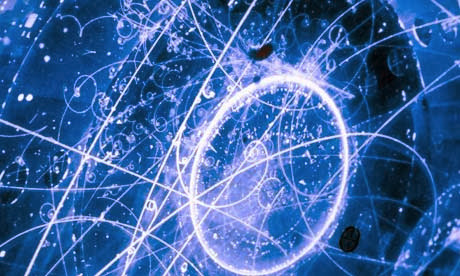Dan Mccoy /Corbis
Scientists Find First Neutrinos from Distant Space
By Michael Moyer | November 21, 2013
The IceCube detector is itself a marvel of engineering. It consists of a three-dimensional grid of over 5,000 sensitive photodetectors suspended in the glacial ice beneath the South Pole. As a neutrino speeds through the grid, it occasionally bumps directly into an atom, setting off a tiny flash of light. The photodetectors pick up this tiny flash, and the data can be used to reconstruct the energy and direction of the neutrino that started it all. Here’s a short clip showing how light from one of the highest-energy neutrinos, nicknamed “Ernie,” passed through the detector:
The researchers next want to try to identify a specific spot on the sky where these high-energy neutrinos are coming from. If they could observe a high-energy event with both ordinary telescopes and neutrino eyes, they could gain a much richer understanding of the mysterious dynamics at the cores of the universe’s most extraordinary events.
[First video courtesy of the IceCube Collaboration]
[Second video courtesy of University Communications/University of Wisconsin–Madison]
About the Author: Michael Moyer is the editor in charge of space and physics coverage at Scientific American. Follow on Twitter @mmoyr



No comments:
Post a Comment